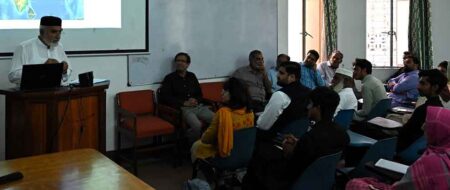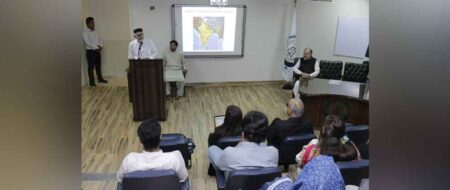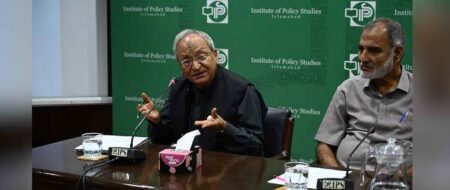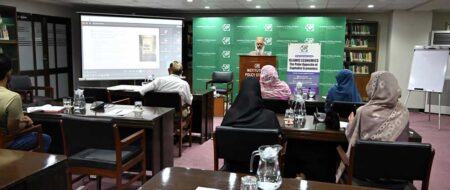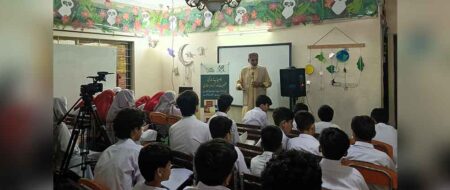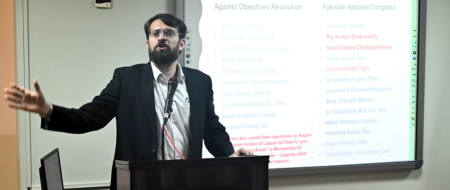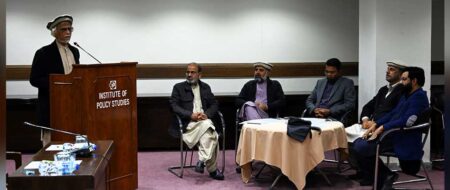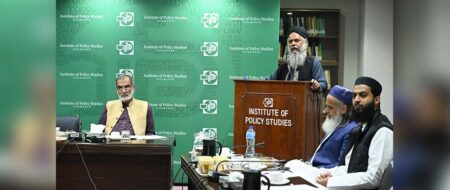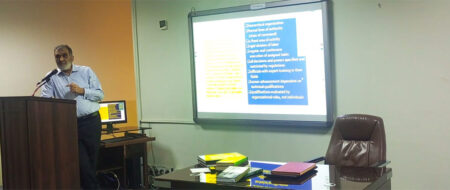An overview of Chinese Political System
With the view to gain an insight into the patterns of the Chinese political system, the second lecture in the series of “understanding China” was organized on May 12, 2010. Hosted by the Institute of Policy Studies, the session was chaired by the former ambassador of Pakistan to China, Khalid Mahmood, with Prof. Zhou Rong as the guest speaker.
With the view to gain an insight into the patterns of the Chinese political system, the second lecture in the series of “understanding China” was organized on May 12, 2010. Hosted by the Institute of Policy Studies, the session was chaired by the former ambassador of Pakistan to China, Khalid Mahmood, with Prof. Zhou Rong as the guest speaker.
Referring to the direct relation the political system retains with the role of China in the contemporary world, Director General, Khalid Rahman, highlighted the significance of studying this vital subject. In his introductory statement he underscored the importance of Confucius teachings behind the philosophy of Chinese thinking in general and particularly in politics, and maintained that the Confucius teachings are easily reflected in the Chinese approach in dealing with the contemporary issues, whether domestic or international.
The chairperson, Khalid Mahmood, in his opening remarks, underscored the role of the demographic, geographic, ethnic and historical experiences in shaping the Chinese political system. Deliberating upon the inevitability of understanding the Chinese political system he maintained that this is important for increasing the people to people contact between both the nations.
While stressing the role of the Communist Party of China (CPC) in the decision making process Khalid Mahmood maintained that the focal point of the Chinese political system is the supremacy of the Communist party, which plays its role by supervising and providing guidance to the policy makers. The political structures in China are characterized by the existence of two parallel hierarchies. On one hand there is the governmental setup, with the president as the head of the state and the premier as the head of the government supported by the state institutions and organizations extending from centre to grass root level. On the other hand there is the hierarchy of the Chinese Communist Party with the party chairmen and general secretaries at the top facilitated by well organized institutions stretching from top to bottom.
 Prof. Zhou Rong started his presentation with some excerpts from the constitution of the Peoples Republic of China and maintained that according to the constitution the people form the source of all power in China. While highlighting the transformation, achieved by the People’s Republic after creation from a New-Democratic to a socialist, he underscored the consolidation and development of the people’s democratic dictatorship, led by the working class and based on the alliance of the workers and peasants.
Prof. Zhou Rong started his presentation with some excerpts from the constitution of the Peoples Republic of China and maintained that according to the constitution the people form the source of all power in China. While highlighting the transformation, achieved by the People’s Republic after creation from a New-Democratic to a socialist, he underscored the consolidation and development of the people’s democratic dictatorship, led by the working class and based on the alliance of the workers and peasants.
The united front forms an essential part of the Chinese political system, characterized by the leadership role of the Communist Party with eight democratic parties alongside playing their role in the decision making process. The remarkable feature of this front is the fact that these parties are not catered as opposition parties, rather they are considered a part of the decision making circles. In this way a system of multiparty-cooperation and political consultation has been evolved, which provides strength to the whole system.
National People’s Congress (NPC) is the central legislative organ. The deputies to the Congress are elected for five years term, and the number of the deputies in the present Congress rests around 3000 (2983). While deliberating upon the rights and responsibilities of the NPC, Prof. Zhou Rong maintained that only NPC can revise the constitution and the power to appoint the President and Prime Minister also rests with this legislative body. The Congress meets annually for ten days in March, however, the Standing Committees constituted out of the Congress on different issues are bound to assemble at least five months a year.
State Council, also called the Central People’s Government, is the uppermost executive organ. The responsibilities of the State Council include the implementation of the principles and policies of the Communist Party and the rules and regulations adopted by the NPC. While deliberating upon the roles and responsibilities of the State Council Prof. Zhou underscored that “the State Council follows the system of premier responsibility in work while various ministries and commissions under the State Council follow the system of ministerial responsibility”.
 Peoples Republic of China is a unitary state, and the entire country is administratively divided into 23 provinces (including Taiwan), 5 autonomous regions, 4 municipalities (Beijing, Shanghai, Tianjin, and Chongqing), and 2 special administrative regions. Starting from province there is a five tiered hierarchy below the centre including prefectures, counties, townships and villages.
Peoples Republic of China is a unitary state, and the entire country is administratively divided into 23 provinces (including Taiwan), 5 autonomous regions, 4 municipalities (Beijing, Shanghai, Tianjin, and Chongqing), and 2 special administrative regions. Starting from province there is a five tiered hierarchy below the centre including prefectures, counties, townships and villages.
While focusing on the difference of political system between the two special administrative regions of Hong Kong and Macao and mainland, he said, the special administrative regions are running under the Chinese official policy of “one country two systems”. The leaders of Hong Kong and Macao are in distinction with the existing political and governmental setup of the rest of the mainland China, the special administrative regions have their own systems evolved during the British or Portuguese rule. The Central Government appoints the chief executives of special administrative regions, which it does with the consultation of the local people.
Elaborating about the government in the special autonomous regions, he said that the government of autonomous region should be from the indigenous ethnic community, for instance in the Uygur autonomous region the head of the government would be a Uygur and not the Han, and this rule equally applies in all autonomous regions such as in Mongolia, Tibet, Ningxia and in Guangxi. Similarly all autonomous regions have their own police. Also the people of autonomous regions can use their own languages along with Chinese, as in Xinjiang Autonomous region there are two languages, one the Chinese and the other is Uygur.
 The Supreme People’s Procuratorate (SPP) is the central prosecutorail agency whose hierarchy extends from top to bottom. Mainly acting as a bridge between public security agencies and the courts they are responsible for the supervision of the criminal investigations, approval of arrests and the prosecution of cases. The Supreme People’s Court (SPC) is the apex judicial authority which works on the principle that all citizens and ethnic groups are equal before law without any discrimination or privilege. The Central Military Commission (CMC) comprises of the leadership of the Chinese military forces. Present Chinese President is also the Chairman of CMC, and therefore it is also the Commanding Chief of the Chinese Military.
The Supreme People’s Procuratorate (SPP) is the central prosecutorail agency whose hierarchy extends from top to bottom. Mainly acting as a bridge between public security agencies and the courts they are responsible for the supervision of the criminal investigations, approval of arrests and the prosecution of cases. The Supreme People’s Court (SPC) is the apex judicial authority which works on the principle that all citizens and ethnic groups are equal before law without any discrimination or privilege. The Central Military Commission (CMC) comprises of the leadership of the Chinese military forces. Present Chinese President is also the Chairman of CMC, and therefore it is also the Commanding Chief of the Chinese Military.
While discussing the election system in China, Prof. Zhou emphasized that China has a combination of direct and indirect election system. For electing the highest post of the country, people do not directly vote for their leader, people vote to the candidates, recommended by different political parties and mass organizations. The elected person by the people called ‘deputies’. These deputies then elect the deputies of higher level above them, and this process continues till the level of the NPC, for electing the President and therefore the Chairman of NPC. The basic unit for the electoral process of deputies is ‘County’.
 While deliberating upon the rise of the Communist Party of China Prof. Zhou said the party was established by a group of intellectuals and the appeal of the CPC was to the poor people. The Party mainly deals with the ideological issues of the country and plays a leadership role in this regard. Prof. Zhou Rong stressed that the ideology of the Communist Party has its roots in the Marxism-Leninism philosophy with a rural focus based on China’s social situation at the time of its inception, however since then and particularly after the founding of the People’s Republic of China it has evolved significantly. China went through a major ideological transformation after Mao Zedong. Deng Xiaoping led China towards Socialism with Chinese characteristics and introduced Chinese economic reforms. On one side these reforms brought significant economic growth and on the other hand Deng Xiaoping Theory (set in the constitution in 1997) characterized a conflict with both the liberalist as well as Maoist thought.
While deliberating upon the rise of the Communist Party of China Prof. Zhou said the party was established by a group of intellectuals and the appeal of the CPC was to the poor people. The Party mainly deals with the ideological issues of the country and plays a leadership role in this regard. Prof. Zhou Rong stressed that the ideology of the Communist Party has its roots in the Marxism-Leninism philosophy with a rural focus based on China’s social situation at the time of its inception, however since then and particularly after the founding of the People’s Republic of China it has evolved significantly. China went through a major ideological transformation after Mao Zedong. Deng Xiaoping led China towards Socialism with Chinese characteristics and introduced Chinese economic reforms. On one side these reforms brought significant economic growth and on the other hand Deng Xiaoping Theory (set in the constitution in 1997) characterized a conflict with both the liberalist as well as Maoist thought.
The ‘third generation’ of leadership, under Jiang Zemin and Zhu Rongji, while largely retaining the vision of Deng Xiaoping, added to the ongoing transformation the idea of “Three Represents”. Prof. Zhou maintained that there are various interpretations of the Three Represents, however, most significantly the theory had legitimized the entry of private business owners into the Party.
The inclusion of the principle of “creation of a Harmonious Society using the Scientific Development Concept” by the ‘fourth generation’ of leadership under Hu Jintao and Wen Jiabao in 2003 attempted to reverse the trends that were responsible for wide range of serious problems arising out of the sheer focus on the economic growth.
 Discussing the functions of the President, Prof. Zhou highlighted that constitutionally the head of the state has power to exercise decisions, nevertheless, all significant matters of national interests take place with the consultation of the Politburo and CMC.
Discussing the functions of the President, Prof. Zhou highlighted that constitutionally the head of the state has power to exercise decisions, nevertheless, all significant matters of national interests take place with the consultation of the Politburo and CMC.
Prof. Zhou inferred that with the progress of the economic liberalization the degree of power of the Communist Party on the state has gradually decreased and the evolution of the ideology of the Communist Party has rendered it somewhat different from its founding principles.
While answering the questions related to the criticism over government policies, Prof. Zhou said that though people may have differences with the government on certain policies but they have faith in their leadership and therefore they respect the system, government and its officials. The speaker maintained that in most cases the people are not uncomfortable due to the democracy problem which is often highlighted by western media in relation with Chinese political system; the discomfort of the people is mainly due to the increasing gap between rich and the poor, between urban and the rural development and between the elites and the common men. He also made clear that realizing the situation of unrest on these grounds the policy makers are taking measures to resolve such problems. Adding to the issue of democracy DG IPS Khalid Rahman said that during his interactions with Chinese scholars and friends he has found that Chinese emphasis is on stability leading to economic development and not pursuing a particular form of Western democracy as most westerners emphasize; their approach is that if the country is developing and the needs of the people are being fulfilled they are happy they don’t need to change their own traditions and living style. The chairman, Khalid Mahmood, while concluding the session, highlighted the transformation in the Chinese political system, he maintained that the power in China is becoming more and more institutionalized rather than personalized. On the similar pattern the society is making gradual progress towards more egalitarian system with the capitalist mode and the democratic system is taking its roots in a proper pace avoiding any catastrophic disruptions in the society.




